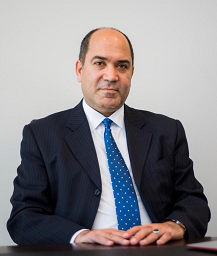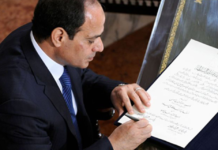MEO had the pleasure to interview Dr. Khaled Abdelaziz Hegazy Acting Dean of the School of Business & Finance, NEWGIZA University, to discuss key points about the new emerging educational system in Egypt, with its challenges and future potentials.

How would you evaluate the recent changes the Egyptian educational system is currently witnessing?
No one can ever deny that the DNA of the educational system in Egypt, has to change; an evolution within the educational system should occur, and in fact the Covid-19 came to force a change to happen.
As an educator, I was able to forecast the shift to digital transformation, bearing in mind that even before Covid-19, big publishers in the academic field were already establishing their E-platforms. We were able to see this shift coming.
And let me tell you that if we will not succeed to do the digital shift we will be way back!
Specifically talking about New Giza University; as a newly established university, already this was taken into consideration from the very beginning and in 2020 when we had to shift to online learning, the transition was not as hard as excepted.
However let me clarify that the adaptation process varied within the educational staff; in other words, young educators were most fast to adapt to this change and this is expected.
Any education system embraces, the professor, the platform and the student. Prior to Covid19, the platform was only physical. Nowadays, the educational platform is to a great extent shifting to online and in fact, its efficiency depends to a great extent on the communication and IT platforms of the country we are living in! such as the internet connection and its speed! Fiber optics and cables cause a lot of problems in Egypt! This is why there must be joined efforts between the government and private institutions.
As well, we strongly need the coming student generation to be IT literate; they need to be well prepared to attend online! A great deal of punctuality as well is needed.
A big question that is addressed, are we well prepared to make the coming student generation IT literate? And able to cope with artificial intelligence that is invading the globe? We must be ready.
As well, we need to pay more attention to interdisciplinary education and help the student to be ready, for the workforce market.
Furthermore, the online assessment criteria needs to be clear and well planned, the student’s attendance and participation must be well monitored. The whole structure is changing! And the whole world is changing and we need to adapt.
A final word, I would say that Covid19 made us reconsider and reprioritize our objectives.
The Egyptian President Abdel Fattah El Sisi, recently announced, that universities need to set majors that would fit the need of the workforce market?
What is your opinion?
I would say that this was really a significant step to take, we desperately need to link the higher educational content to the workforce market; why people receive education? The answer is in order to serve the workforce market!
For already established universities, this step might not be an easy one as they need to take
many approvals from the Supreme Council of Universities in order to do the necessary amendments in majors studied.
It might be actually, more feasible to start with newly established universities scattered in the various Egyptian cities.
However, we must pay great attention to the sustainability of newly established universities; establishing a new university requires huge sums of money; hence there must be an excellent economic plan to ensure the sustainability of the university. As well, back up plans need to be ready in case the university faces any challenges related to the number of students or its capacity.
I would add that we need to integrate interdisciplinary educational programs and systems; this rigid separation of majors is no longer productive; the student needs to be aware of several subjects, even if he/she is studying a specific major; he/she needs to learn cross subjects as well! this is why at the beginning of my talking I said that we need to change the DNA of the whole educational system, as well we need more doers, and in fact young educators are able to grasp the digital transformation much quicker!
To what extent do you believe that private universities help to better the quality of education in Egypt, taking into consideration that they serve a certain segment?
I believe that the academic sector in Egypt is one pool; as a private university, we try to get the best educators, whether Egyptians or non-Egyptians, in order to better the quality of education.
And let me tell you that the online transformation, will definitely pave the way to make use of the best expertise, whether in private or governmental universities. Globalization and interconnection will definitely benefit the quality of education in various universities.
However, let me clarify an important point, there are two types of private universities, a commercial private university and a private university that delivers good quality of education that meets high standards.
The commercial private university is so much driven by the idea of making profits; its main concern is to make high returns on investment even if the quality of education doesn’t’ meet high standards; they might even admit many students, more than the university capacity can take, and this definitely affects the quality of education! whereas there are other private universities that target mainly delivery of high quality of education.
How would you evaluate the cooperation of governmental university with global universities or with private ones?
Well, the governmental universities are starting to move forward into agreements with global universities. The key is to make more agreements whether with the private sector in Egypt or with global universities; however, one of the main challenges that face the governmental educational institutions is the financial aspect; it needs a good budget to get the needed good educational expertise.
As well, shifting to online education, definitely needs a good budget. The question here is should the governmental universities raise its fees? Meanwhile it acts under the supervision of the Supreme Council of Universities. It is a good question to address. Some decisions need to be taken according to market needs and demands; much flexibility is needed I believe.
With the new global digital era, how do you see this shift affecting the traditional university library? Is the university library considered a decisive element in the evaluation process of any university?
Definitely the traditional form of library is shifting; the digital library is emerging. Subscriptions in online academic journals and periodicals is taking place with a relatively fast pace. For sure yes, the university library is considered a decisive element in the evaluation process of any university; talking about the traditional library, the display, classifications, are all crucial elements to be considered. As for the digital, the numbers of subscriptions is a decisive element.
But let me talk about one of the most successful Egyptian educational projects, which is the knowledge bank; it really helped nearly all Egyptian Universities. It displays extremely excellent academic sources for free! Noting that subscription fees in any online periodical is extremely expensive; it really helped! Such an effort needs to be praised.
Do you think that the digital shifting would negatively affect, the printed books business?
No, I don’t think so. We won’t be able to advance, unless we let go of the old fashioned mentalities, who claims that the digital shifting won’t succeed ! For sure the digital shifting will happen slowly in Egypt, and it won’t substitute the printed book; the educational system needs both! We just need much flexibility, to adapt to the new shift. As well the workforce market, will eventually needs excellent IT literate graduates; the whole world is shifting, how can we hold back the global change? We need to catch up with the educational digital change that is taking place.












